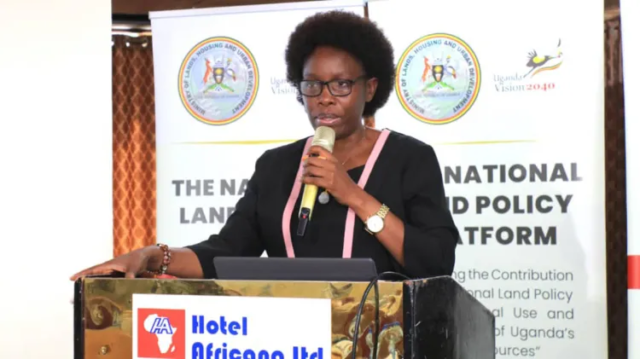
Lands minister Judith Nabakooba has laid new plans to be undertaken during the next 10 years of the National Land Policy (NLP). The new plan was outlined on October 31 as she opened the inaugural National Land Policy platform, a three-day workshop held at Hotel Africana in Kampala to review the implementation of the National Land Policy in Uganda.
According to her, a lot has been achieved in the land sector and they have as well registered some loopholes for the past decade through NLP that was approved in 2013 by the cabinet to oversee areas of land administration.
“The day is to reflect on what has been done and where we are not doing well for the ministry to identify where the problems are and we see how to address them. I believe all stakeholders present today will be in position to come up with concrete practical recommendations that will help us to improve where we have not been in position to perform to the levels,” she noted.
After 10 years of implementing the Land Policy, the ministry of Lands with support of GIZ-Uganda and European Union commissioned an impact study to assess the implementation of the land policy as per the target and during this workshop, the focus is going to be on identifying the gaps, challenges and emerging issues of implementing NLP.
The workshop is organized under the theme: “Assessing the contribution of the national land policy to the optimal use and management of land resources in Uganda.” Ms Nabakooba noted that the NLP articulates the role of land in national development, land ownership, distribution, utilization, management and control of land and to ensure that land is used optimal to transform the society from a peasant state to the income middle country.
“The ministry today is overseeing the transformation of cities, urban centers are transitioning into smart cities and sustainable locations,” she said.
In the new framework, the minister considers land tenure systems as stipulated under the law that constitutes land allocations, adjudication, the cadastral survey, land registration, land records management and land disputes resolution as one of the key areas to be worked on.
The minister acknowledges that there has been enormous cases of land conflicts especially in Buganda and Bunyoro regions with the fact that even government through the Uganda Land Fund bought land for people who were facing evictions.
She said land conflict resolution will as well be given a priority in this new era of the policy. “Land conflicts is everywhere which calls for a collective responsibility to fight it together with other agencies on the ground. We are looking at the cases handled by the Resident District Commissioners to ensure that they serve justice,” she explained.
The minister shared that she has received several reports about delay of courts in handling land matters, with some cases taking over 10 years without being heard. Here, she pledged to engage court to ensure that they attend to land related cases quickly.
“From the report of the previous 10 years, about 30,000 cases have not been handled which might increase the cases in the backlog and going forward if they are not handled, they number is going to accumulate on the old cases.”
In this exercise, the minister noted that police will assist them in handling situations of chaos with people who use force in handling land issues to reduce land disputes. Other areas to be intensified include Land valuation and taxation considering land acquisition by government, land transactions, land related taxes and rate. The land use plan and control will also be put at a forefront by issuing development permits to the investors and other developers.

The land tenure security will also be tackled to curb issues arising from land documentation. In the next 10 years, Informal settlements, accuracy and consistence of evaluation, property identification, encroachment on fragile ecosystems such as wetlands, the forests, the tourism sites and excessive land fragmentation, affordable houses, tax incentives to the real estate people, land speculation and physical planning will also be key center points.
In her remarks, Mrs Dorcas Okalany, the Permanent Secretary in the Ministry of Lands said that NLP recognizes the importance of the efficient, equitable, optimal utilization and management of Uganda’s land and land based resources for poverty reduction, wealth creation and social economic development in the country.
Ms Naomi Kabanda, the Acting Director Land Development in the Ministry of Lands revealed that NLP platform is intended to do an assessment of the land policy for the last 10 years. And the next step is to draft the next national land policy for the coming10 years incorporating new areas in addition to continuing with the existing one that will be worked on.






